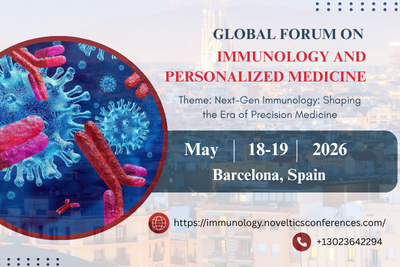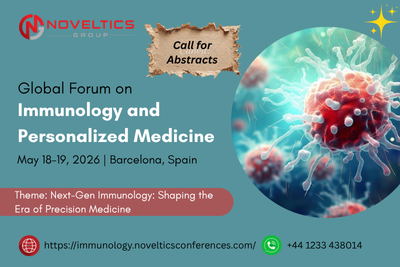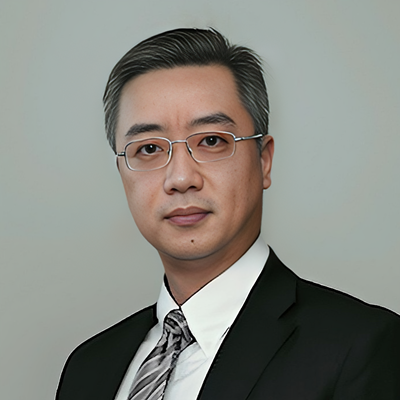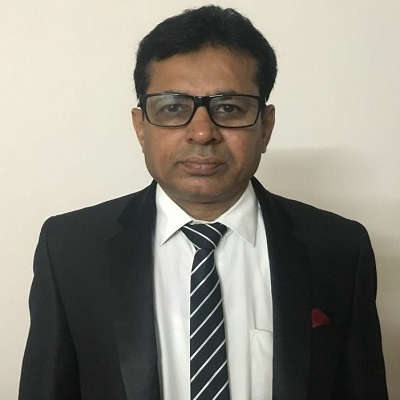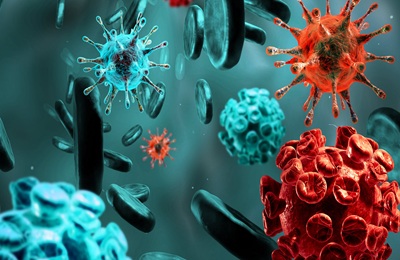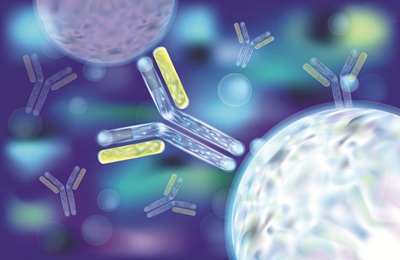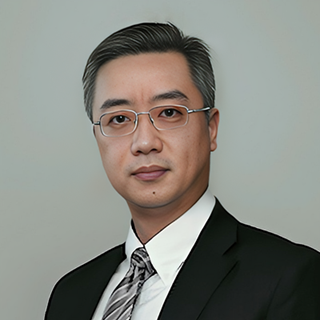Session 01: Immunology
Immunology continues to transform healthcare by uncovering how the immune system defends, adapts, and sometimes malfunctions. This session will highlight recent advances in immune cell biology, antigen recognition, and signaling pathways that shape host defense. Key discussions will address autoimmunity, chronic inflammation, and immune evasion by infectious agents and cancers. The session will also explore cutting-edge tools such as single-cell analysis and gene editing for mapping immune responses. Bridging research with practice, it will showcase how novel immunotherapies, precision vaccines, and diagnostic innovations are revolutionizing treatment strategies across infectious diseases, oncology, and immune-mediated disorders.
Session 02: Molecular and Cellular Mechanisms of Immune Regulation
Immune regulation depends on complex molecular and cellular pathways that ensure balance between defense and tolerance. This session explores how cytokines, transcription factors, and signaling cascades shape immune cell function. It will also highlight the roles of immune checkpoints, regulatory T cells, and co-stimulatory signals in preventing overactive immune responses. Understanding these mechanisms is critical for developing targeted immunotherapies in cancer, autoimmunity, and infectious diseases. Attendees will gain insights into the dynamic crosstalk between immune cells and molecular regulators, helping bridge basic research with clinical applications.
Session 03: Immunogenetics and Genomic Approaches
Genetic variations strongly influence immune responses and disease outcomes. This session examines immunogenetics, focusing on genes like HLA and their role in susceptibility to infections, autoimmunity, and cancer. Advances in genomics and next-generation sequencing now allow precise mapping of immune-related genes, providing biomarkers for diagnosis and therapy. The session will also address genetic mutations that cause primary immunodeficiencies and hypersensitivity syndromes. By combining genetic insights with clinical practice, researchers and physicians can move toward precision medicine—tailoring treatments to each individual’s immune profile.
Session 04: Autoimmunity and Immune Tolerance
When immune tolerance fails, the immune system mistakenly targets the body’s own tissues, leading to autoimmune diseases. This session explores the mechanisms of central and peripheral tolerance, their breakdown, and the resulting pathologies. Case examples include rheumatoid arthritis, multiple sclerosis, and type 1 diabetes. Attendees will also learn about environmental and genetic risk factors that influence autoimmune development. The session highlights emerging therapies that aim to restore tolerance, such as antigen-specific immunotherapies and regulatory T-cell modulation
Session 05: Allergy and Hypersensitivity Disorders
Allergies and hypersensitivity reactions occur when the immune system overreacts to harmless substances. This session will outline the four major types of hypersensitivity, including IgE-mediated allergies, T-cell–driven responses, and immune complex disorders. Participants will explore clinical manifestations such as asthma, food allergies, and drug hypersensitivity. New diagnostic approaches, including component-resolved allergy testing, and novel biologics such as anti-IgE therapies, will be discussed. The session also considers the global rise in allergic conditions and the need for prevention strategies. By integrating basic immunology with therapeutic advances, this session provides an updated perspective on managing hypersensitivity disorders.
Session 06: Immunology of Infectious Diseases
This session explores how the immune system combats bacterial, viral, fungal, and parasitic infections. It will highlight innate defense mechanisms such as phagocytosis and complement activation, as well as adaptive responses including antibody production and T-cell–mediated immunity. Attendees will also learn how pathogens evade immune responses, leading to chronic or severe infections. Emerging infectious diseases, antimicrobial resistance, and global health challenges will be addressed, along with the role of vaccines and immunotherapies in preventing and treating infections. By integrating clinical case studies with basic immunology
Session 07: Cancer Immunology
Cancer immunology examines how tumors interact with and evade the immune system. This session will explore mechanisms of tumor immune escape, including suppression by regulatory cells, secretion of inhibitory cytokines, and immune checkpoint activation. Attendees will learn about the tumor microenvironment and its role in shaping immune responses. The session will also cover advances in immunotherapy, including checkpoint inhibitors, CAR-T cell therapy, and cancer vaccines. By linking laboratory discoveries to clinical applications, the session highlights how immunology is transforming oncology. It will emphasize both the challenges and future opportunities in harnessing the immune system to fight cancer more effectively.
Session 08: Transplantation Immunology
Transplantation offers life-saving treatments, but immune rejection remains a major challenge. This session examines the immunological basis of graft rejection, focusing on antigen recognition, T-cell activation, and alloantibody responses. Participants will also learn about strategies to promote graft tolerance, including immunosuppressive therapies, regulatory T-cell modulation, and induction of immune tolerance. Advances in organ and stem cell transplantation, as well as emerging approaches like xenotransplantation, will be discussed. By understanding the mechanisms behind rejection and tolerance, researchers and clinicians can work toward safer, more effective transplantation outcomes. This session bridges basic immunology with practical clinical applications in surgery and regenerative medicine.
Session 09: Neuroimmunology
Neuroimmunology studies the complex interactions between the nervous and immune systems. This session will explore how immune cells contribute to neurological health and disease, including conditions such as multiple sclerosis, Alzheimer’s disease, and neuroinflammation. Participants will learn about the role of the blood–brain barrier, microglia, and peripheral immune cells in shaping brain function and pathology. The session will also highlight emerging therapies targeting immune pathways in neurological disorders, such as monoclonal antibodies and cytokine inhibitors. By integrating neuroscience and immunology, this session offers new perspectives on understanding brain–immune communication and its implications for therapy.
Session 10: Immuno-oncology and Checkpoint Therapies
This session focuses on immuno-oncology, an area that has revolutionized cancer treatment by harnessing the immune system. It will highlight immune checkpoint inhibitors targeting CTLA-4, PD-1, and PD-L1, which have shown remarkable success in treating various cancers. Attendees will learn about mechanisms of immune evasion, the importance of tumor mutational burden, and the role of biomarkers in predicting therapy response. The session will also discuss resistance to immunotherapy and strategies to overcome it, including combination treatments. By integrating clinical research with molecular insights, this session emphasizes how checkpoint therapies are reshaping oncology and advancing personalized cancer care.
Session 11: Vaccines and Immunotherapy
This session explores how vaccines and immunotherapies are transforming disease prevention and treatment. It will cover the principles of vaccine design, from traditional inactivated vaccines to novel mRNA and vector-based platforms. Participants will also learn about cancer vaccines, therapeutic vaccines for chronic infections, and immune-boosting strategies. On the immunotherapy side, the session will discuss monoclonal antibodies, cytokine therapies, and cellular immunotherapies such as CAR-T cells. With real-world case studies and emerging research, the session highlights how vaccination and immune-based therapies work hand-in-hand to fight infections, cancers, and immune-related disorders. The discussion will emphasize ongoing innovations and the future of immune-based clinical care.
Session 12: Immunometabolism
The field of immunometabolism explores how metabolic pathways regulate immune cell function and fate. This session will examine how nutrients, signaling molecules, and energy metabolism influence immune activation, differentiation, and tolerance. Attendees will learn how metabolic reprogramming supports immune responses during infection, cancer, and inflammation, while metabolic dysregulation can lead to chronic disease. Cutting-edge research linking metabolism with immunotherapy effectiveness will also be highlighted. By bridging immunology and metabolism, the session will provide new insights into disease mechanisms and potential therapeutic targets. It emphasizes how understanding immune cell metabolism can open new opportunities for personalized treatment strategies.
Session 13: Microbiome and Immune System
This session focuses on the dynamic relationship between the human microbiome and the immune system. The gut, skin, and respiratory microbiota play vital roles in shaping immunity, tolerance, and protection against pathogens. Disruptions to the microbiome are linked with autoimmune diseases, allergies, cancer, and chronic inflammation. Participants will explore advances in microbiome research, including probiotics, prebiotics, and microbiota-targeted therapies that aim to restore immune balance. The session will also highlight how microbiome analysis can serve as a biomarker for health and treatment response. By uncovering the microbiome’s influence on immunity, attendees will gain fresh perspectives on therapeutic innovation and precision medicine.
Session 14: Comparative and Evolutionary Immunology
Comparative and evolutionary immunology provides valuable insights into how immune systems have developed across species. This session will examine immune diversity in animals, from invertebrates to vertebrates, and its relevance to human health. Participants will learn how studying different immune systems can shed light on disease resistance, host–pathogen co-evolution, and novel therapeutic strategies. The session will also highlight evolutionary pressures that have shaped immune gene families such as MHC and TLRs. By understanding immunity in a broader biological context, researchers can discover new models for immunology and develop innovative approaches to combat human disease.
Session 15: Advanced Technologies in Immunology
This session highlights how cutting-edge technologies are revolutionizing immunology research and clinical practice. Topics will include single-cell sequencing, CRISPR-based gene editing, advanced imaging techniques, and AI-driven data analysis. These tools allow unprecedented insights into immune cell function, disease mechanisms, and therapeutic targets. Attendees will also learn how multi-omics approaches integrate genomics, transcriptomics, and proteomics to build a holistic view of immune responses. Real-world applications in cancer immunotherapy, infectious disease monitoring, and autoimmune research will be discussed. By showcasing technological innovations, the session underscores how modern tools are accelerating discoveries and shaping the future of personalized immunology.
Session 16: Personalized Medicine
This session introduces the concept of personalized medicine, where treatments and preventive strategies are tailored to an individual’s genetic, lifestyle, and environmental factors. It will highlight the shift from a “one-size-fits-all” approach to precision healthcare, with examples from oncology, cardiology, and infectious diseases. Attendees will learn how genomics, molecular profiling, and advanced diagnostics are transforming clinical decision-making. The session will also discuss challenges in implementation, such as accessibility, cost, and integration into healthcare systems. By setting the stage for the rest of the conference, this session provides a comprehensive overview of personalized medicine and its potential to revolutionize patient outcomes.
Session 17: Pharmacogenomics
Pharmacogenomics explores how genetic variations affect drug response, safety, and efficacy. This session will discuss how pharmacogenomic testing can guide personalized treatment decisions, reduce adverse drug reactions, and optimize therapeutic outcomes. Real-world applications in oncology, psychiatry, and cardiology will be highlighted, showcasing how genetic information influences drug choice and dosage. Advances in genome sequencing and bioinformatics are accelerating the adoption of pharmacogenomics into clinical practice. Attendees will also gain insights into regulatory perspectives, ethical challenges, and strategies for integrating pharmacogenomic testing into routine care.
Session 18: Biomarkers and Companion Diagnostics
This session focuses on the use of biomarkers and companion diagnostics to guide personalized treatment strategies. Biomarkers such as genetic mutations, protein expression, and circulating tumor DNA provide valuable information about disease prognosis, therapy response, and drug safety. Companion diagnostics enable clinicians to match patients with the most effective targeted therapies, particularly in oncology and immunotherapy. Attendees will learn about advances in biomarker discovery, validation, and clinical application. The session will also address challenges in biomarker standardization and regulatory approval. By integrating biomarkers into clinical decision-making, personalized medicine can improve outcomes, minimize side effects, and enable cost-effective healthcare solutions
Session 19: Genomics, Proteomics, and Metabolomics
Omics technologies are central to advancing personalized medicine. This session will explore genomics, proteomics, and metabolomics, highlighting how they provide a comprehensive understanding of disease mechanisms and individual variability. Genomics offers insights into inherited risk, while proteomics and metabolomics reveal functional changes in cells and tissues. Together, these approaches enable the identification of biomarkers, drug targets, and personalized treatment strategies. Case studies in oncology, metabolic disorders, and rare diseases will illustrate their clinical relevance. The session will also discuss advances in high-throughput technologies, bioinformatics, and systems biology. By integrating multi-omics data, healthcare can move toward a truly personalized approach.
Session 20: Personalized Oncology Approaches
Oncology has been at the forefront of personalized medicine. This session will focus on targeted therapies, immunotherapies, and precision diagnostics that are reshaping cancer treatment. Attendees will learn how genomic profiling of tumors enables clinicians to select therapies based on specific mutations, such as EGFR, HER2, or BRCA. Advances in liquid biopsies, circulating tumor DNA, and predictive biomarkers will also be highlighted. The session will showcase successful case studies in breast, lung, and hematological cancers where personalized approaches have improved survival rates. Challenges in resistance, cost, and access will also be discussed. By combining science with patient care, personalized oncology offers a model for precision medicine across disciplines.
Session 21: AI and Big Data in Personalized Medicine
Artificial intelligence (AI) and big data are revolutionizing personalized medicine by enabling advanced analysis of complex biological and clinical datasets. This session will highlight how machine learning and predictive modeling improve disease diagnosis, risk prediction, and treatment selection. Case studies will illustrate applications in oncology, cardiology, and genomics. Attendees will also explore how electronic health records, wearable devices, and population-level data are integrated to provide real-time insights into patient care.
Session 22: Ethical and Legal Aspects of Precision Healthcare
The rise of personalized medicine raises important ethical, legal, and social questions. This session will explore issues related to patient privacy, genetic data ownership, consent, and equity of access to precision therapies. Attendees will learn about challenges in integrating genetic testing into healthcare, such as discrimination risks and cultural considerations. The session will also examine international regulations and frameworks guiding personalized medicine. Case discussions will highlight real-world dilemmas in genomics and data sharing. By addressing these complex issues, the session aims to foster responsible innovation, ensuring that personalized medicine advances while protecting patients’ rights and promoting equitable access to care.
Session 23: Personalized Vaccines and Immunotherapies
Personalized vaccines and immunotherapies represent a cutting-edge frontier in healthcare. This session will examine how individualized cancer vaccines, neoantigen-based therapies, and adaptive immunotherapies are being developed to target specific patient profiles. Attendees will also learn about advances in personalized infectious disease vaccines and how genomic data informs vaccine design. The session will highlight CAR-T cell therapies, immune checkpoint combinations, and individualized immune monitoring approaches. By linking immunology with precision medicine, this session emphasizes how tailoring immune-based therapies to each patient’s biology can improve efficacy, reduce side effects, and open new avenues for treating both cancer and chronic diseases.
Session 24: Digital Health and Remote Monitoring
Digital health technologies are central to delivering personalized care in real time. This session will explore innovations such as wearable devices, mobile health apps, and remote monitoring platforms that allow continuous tracking of patient health. Attendees will learn how these tools generate valuable data for personalized treatment, improve adherence, and enable early intervention. The session will also highlight how telemedicine and digital platforms enhance access to care, particularly in remote or underserved areas. Challenges such as data security, device integration, and user adoption will be addressed. By combining technology with medicine, digital health paves the way for more patient-centered and personalized healthcare delivery.
Session 25: Future of Precision Medicine
This session will focus on emerging trends and the future directions of personalized medicine. Attendees will explore how gene editing technologies such as CRISPR, regenerative medicine, and advanced omics are driving the next wave of healthcare innovations. The session will also discuss the integration of AI, digital health, and global data-sharing initiatives to achieve truly predictive, preventive, and personalized care. Key challenges—including cost, accessibility, and regulatory hurdles—will be addressed alongside opportunities for global collaboration. By envisioning the future, this session inspires participants to think beyond current limitations and embrace a healthcare model that is proactive, precise, and patient-centered.
